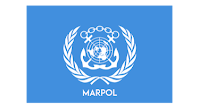Sewage:
'Sewage' means
- Drainage and other wastes from any form of toilets and urinals
- Drainage from medical premises (dispensary, sickbay, etc.) via wash basins, wash tabs and scuppers located in such premises
- Drainage from spaces containing living animals
- Other waste-waters when mixed with the drainage defined above.
Holding tank:
A holding tank means a tank used for the collection and storage of sewage.
Animal Carcasses:
Cooking Oil:
Domestic waste:
Fishing gear:
Food Waste:
Incinerator Ashes:
Garbage:
Operational wastes:
- Operational waste means all solid wastes that are collected onboard during normal maintenance or operations of a ship, or used for cargo stowage and handling.
- Operational waste also includes cleaning agents and additives contained in the cargo hold and external wash water.
- Operational waste does not include grey water, bilge water, or similar discharges essential to the operation of a ship.
Plastic:
- Plastic means a solid material that contains as an essential ingredient one or more high molecular mass polymers and which is formed during either manufacture of polymer or the fabrication into a finished product by heat and/or pressure.
- Plastics have material properties ranging from hard and brittle to soft and elastic.
- "All Plastic" means all garbage that consists of or includes plastic in any form, including synthetic ropes, synthetic fishing nets, plastic garbage bags and incinerator ashes from plastic products.
Auxiliary Control Device:
Auxiliary control device means a system, function or control strategy installed on a marine diesel engine that is used to protect the engine and/or its auxiliary equipment against operating conditions that could result in damage or failure, or that is used to facilitate the starting of the engine.
Continuous Feeding:
It is defined as the process whereby waste is fed into a combustion chamber without human assistance while the incinerator is in normal operating conditions with the combustion chamber operative temperature between 850 degrees Celcius and 1200 degrees Celcius.
Emission:
Emission means any release of a substance, subject to control by this Annex, from ships into the atmosphere or sea.
Emission Control Area:
It means an area where the adoption of special mandatory measures for emissions from ships is required to prevent, reduce and control air pollution from NOx or SOx and particulate matter or all three type of emissions and their attendant adverse impacts on human health and the environment.
Irrational Emission Control Strategy:
It means any strategy or measure that, when the ship is operated under normal conditions of use, reduces the effectiveness of an emission control system to a level below that expected on the applicable emission test procedures.
Ozone-depleting Substances:
Ozone-depleting substances means controlled substances that deplete the Ozone layer.
Ozone-depleting substances that may be found onboard ship includes the following:
- Halon 1211 Bromochlorodifluoromethane
- Halon 1301 Bromotrifluromethane
- Halon 2402 1, 2-Dibromo-1, 1, 2, 2-tetrafluoromethane (also known as Halon 114B2)
- CFC-11, Trichlorofluoromethane
- CFC-12, Dichlorodifluromethane
- CFC-113 1, 1, 2-Trichloro-1, 2, 2-trifluroethane
- CFC-114 1, 2-Dichloro-1, 1, 2, 2-tetrafluroethane
- CFC-115 Chloropentafluroethane
Shipboard Incinerator:
Shipboard Incineration:
Reference: IMO Publications & Documents - International Conventions - MARPOL







0 Comments
Thanks for your Valuable comments and Suggestions